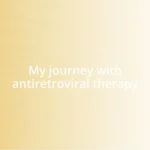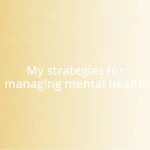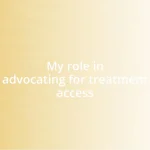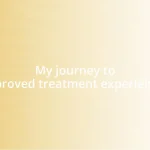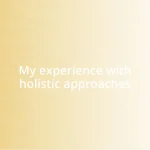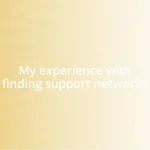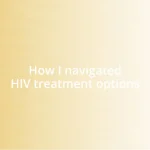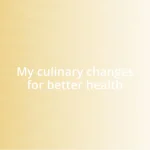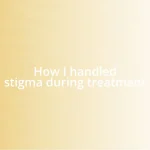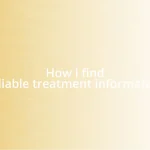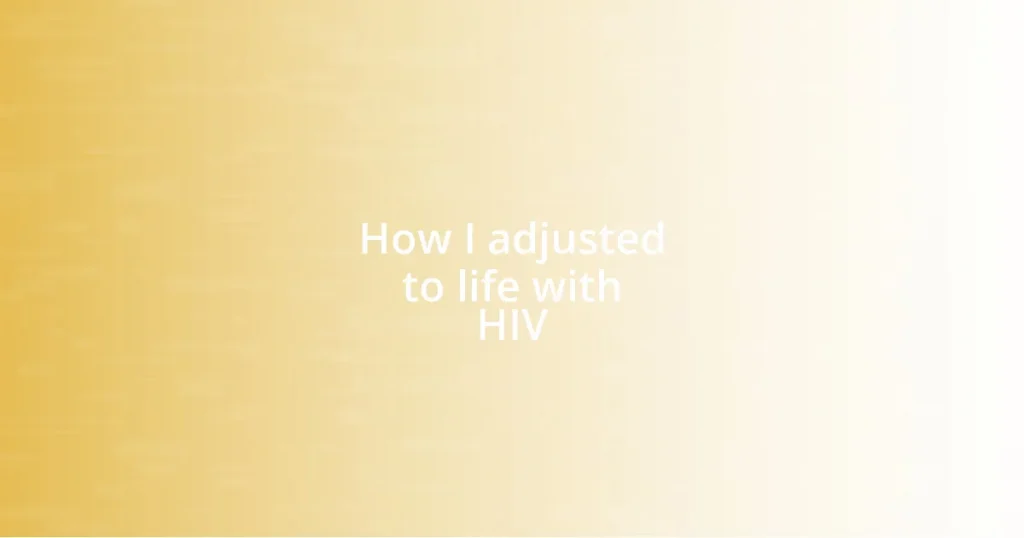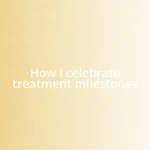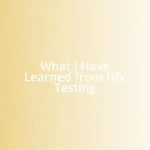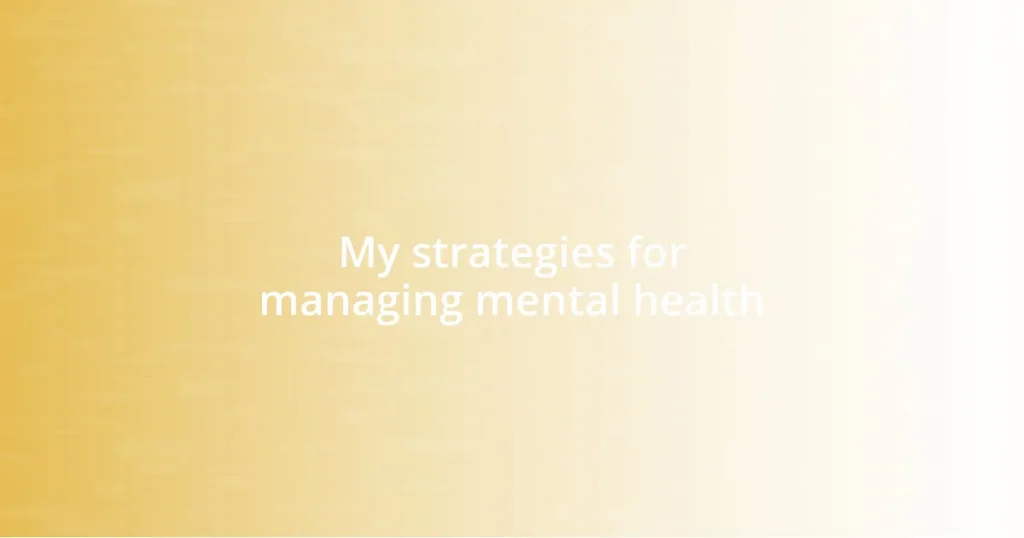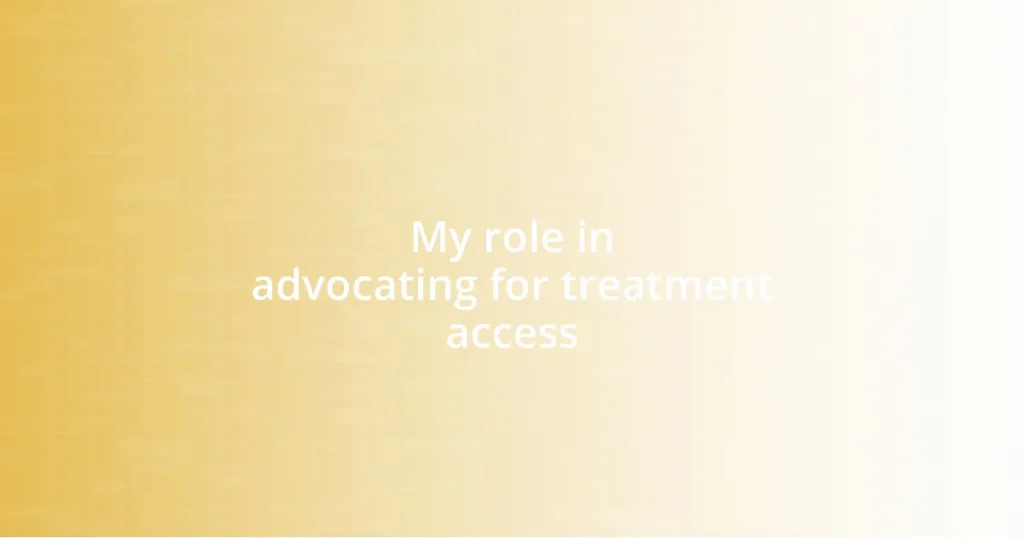Key takeaways:
- Receiving an HIV diagnosis can lead to overwhelming emotions; understanding the virus is a crucial step in managing it.
- Building a support network through friends and support groups provides necessary emotional support and a sense of community.
- Active participation in healthcare—asking questions, keeping a health journal, and sticking to medication schedules—empowers individuals to better manage their health.
- Maintaining a healthy lifestyle through nutrition, exercise, and proper sleep positively impacts both physical and emotional well-being.
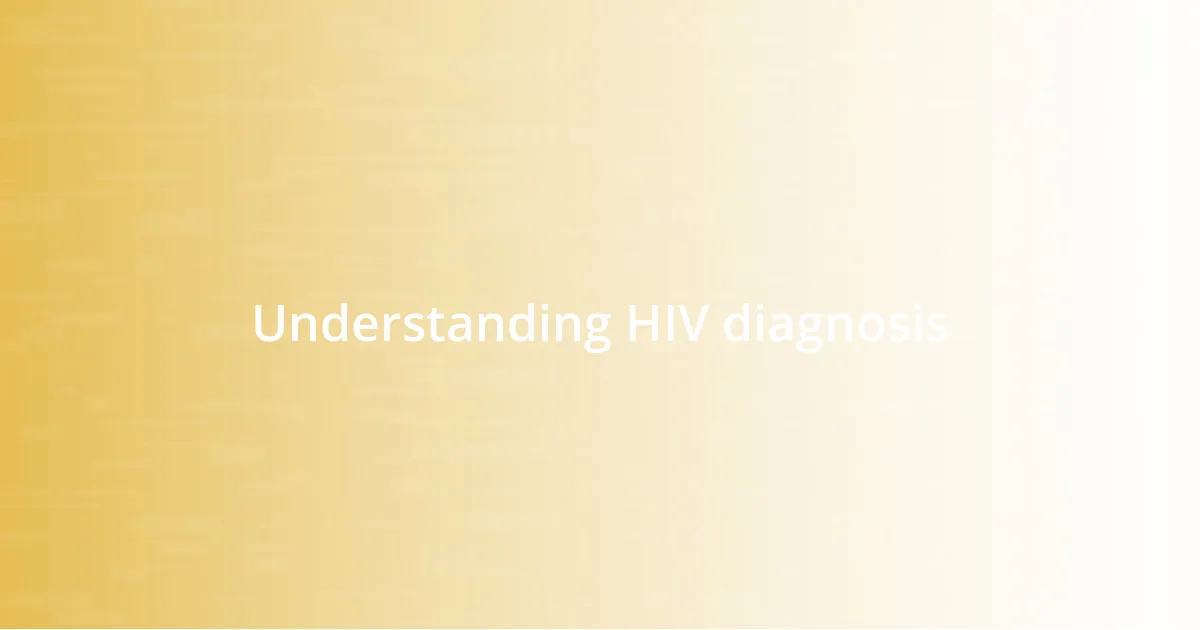
Understanding HIV diagnosis
Receiving an HIV diagnosis can be a whirlwind of emotions. I vividly recall sitting in the doctor’s office, my heart racing as I absorbed the words—“You are HIV positive.” It felt surreal, like I was watching a movie unfold rather than living my own reality. It makes me wonder: how can a single piece of information change your entire life in a matter of seconds?
Understanding HIV means grasping its complexities and implications. When I first learned about the virus, I had so many questions swirling in my mind: How did this happen? What does it mean for my future? Delving into the science behind HIV and how it interacts with the immune system brought clarity amidst the chaos. It’s not just a medical condition; it’s a journey of learning.
As I processed my diagnosis, I also discovered the importance of knowledge and support. I began to seek out resources, connecting with others who had experienced similar situations. Have you ever felt the power of community during tough times? For me, it was a revelation. Understanding HIV was not just about the medical aspects, but also realizing that I wasn’t alone on this journey.
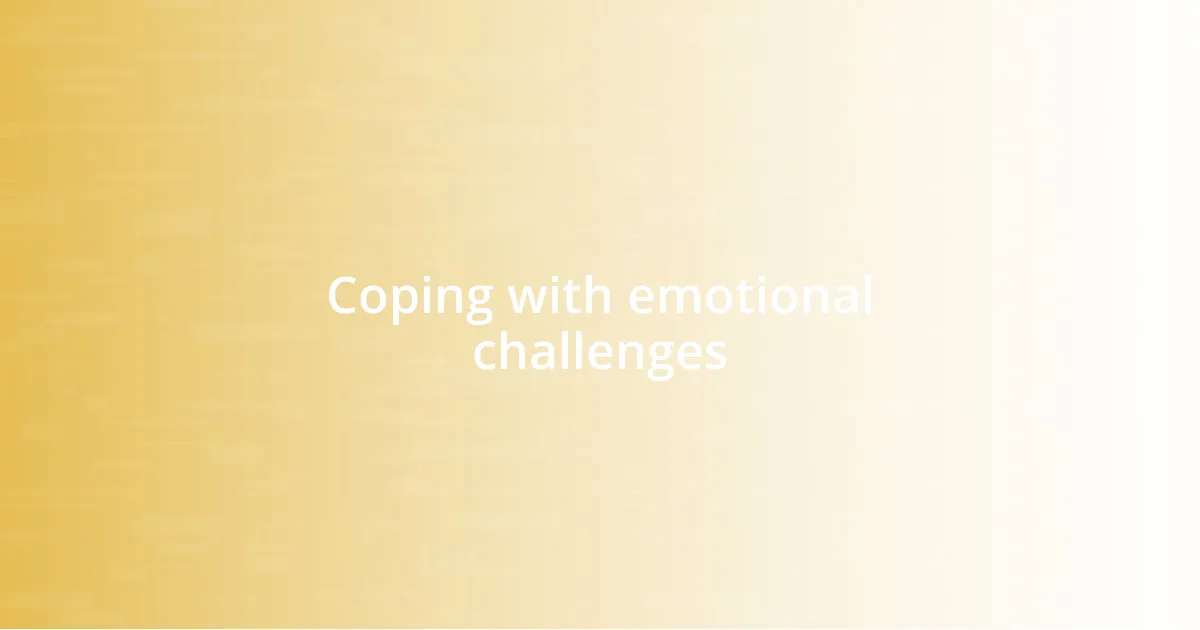
Coping with emotional challenges
Coping with the emotional challenges that come with an HIV diagnosis can be one of the toughest parts of adjusting to this new reality. I remember nights when sadness crept in, often turning into a wave of anxiety that left me breathless. It’s hard to articulate, but those moments forced me to confront feelings of fear and isolation. One key step in my journey was allowing myself to feel these emotions, rather than suppressing them.
To navigate these emotional ups and downs, I found a few strategies particularly helpful:
- Journaling: Writing down my thoughts helped me articulate my fears and hopes. It became a safe space where I could vent without judgment.
- Therapy: Speaking with a professional provided not only a sounding board but also practical coping techniques tailored to my situation.
- Mindfulness and Meditation: I started practicing mindfulness, which taught me to remain present and reduce anxiety about the future.
- Connecting with Others: Sharing experiences in support groups created a sense of community and helped normalize my feelings.
- Exercise: Physical activity became an outlet for my emotions and helped lift my mood.
Each of these techniques not only aided my healing process but also equipped me with resilience for the challenges that lay ahead.
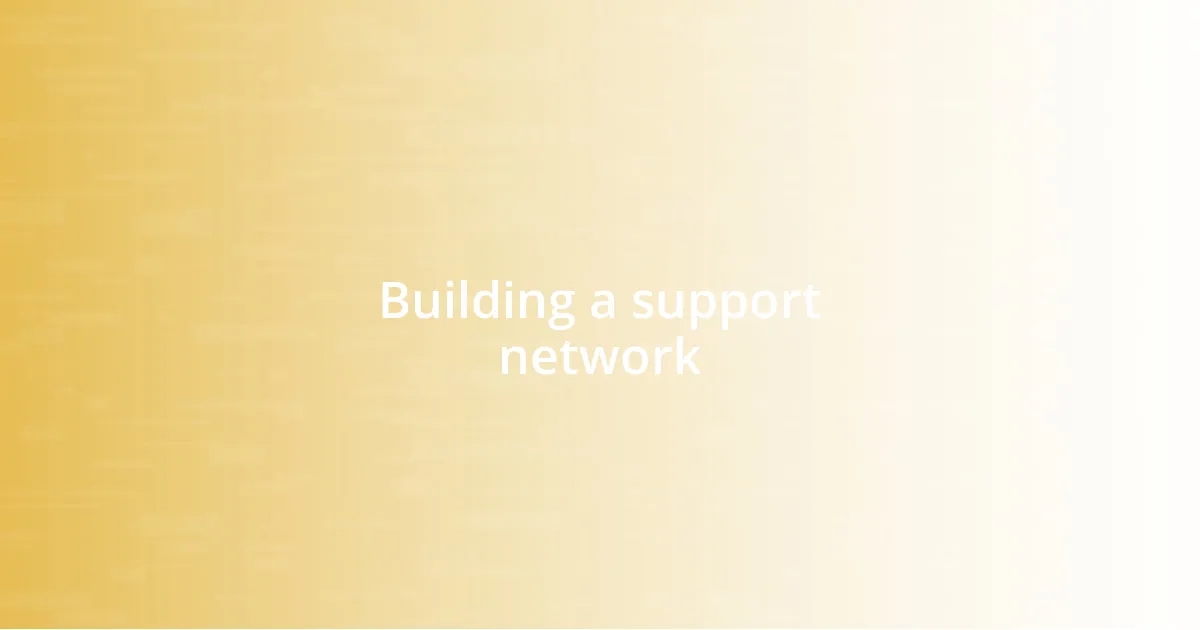
Building a support network
Building a support network was crucial for me after my HIV diagnosis. I remember feeling isolated at first; it was as if I was the only one navigating this path. Reaching out to others was a lifeline. I joined local support groups, where sharing my journey with people who genuinely understood meant the world to me. It isn’t just about talking—it’s about forging connections that make you feel seen and validated.
Along the way, I found that my closest friends also wanted to understand my experience better. I opened up to them about living with HIV, and surprisingly, conversations blossomed. They became my sounding board, celebrating my victories and helping me through tough days. Don’t underestimate the power of honest communication with those you trust. Have you ever noticed how vulnerability can invite support? In my case, it brought us closer and strengthened our bonds.
It’s essential to remember that building a support network doesn’t happen overnight. It takes time and patience. I started with small steps—attending meetings, reaching out to old friends, and searching for online forums. Each connection was like adding another piece to my safety net, reminding me that I wasn’t alone. Knowing that others were rooting for me made a significant difference in how I approached my life with HIV.
| Support Network Source | Benefits |
|---|---|
| Support Groups | Shared experiences and understanding |
| Close Friends | Emotional support and openness |
| Online Communities | Anonymity and broad perspectives |
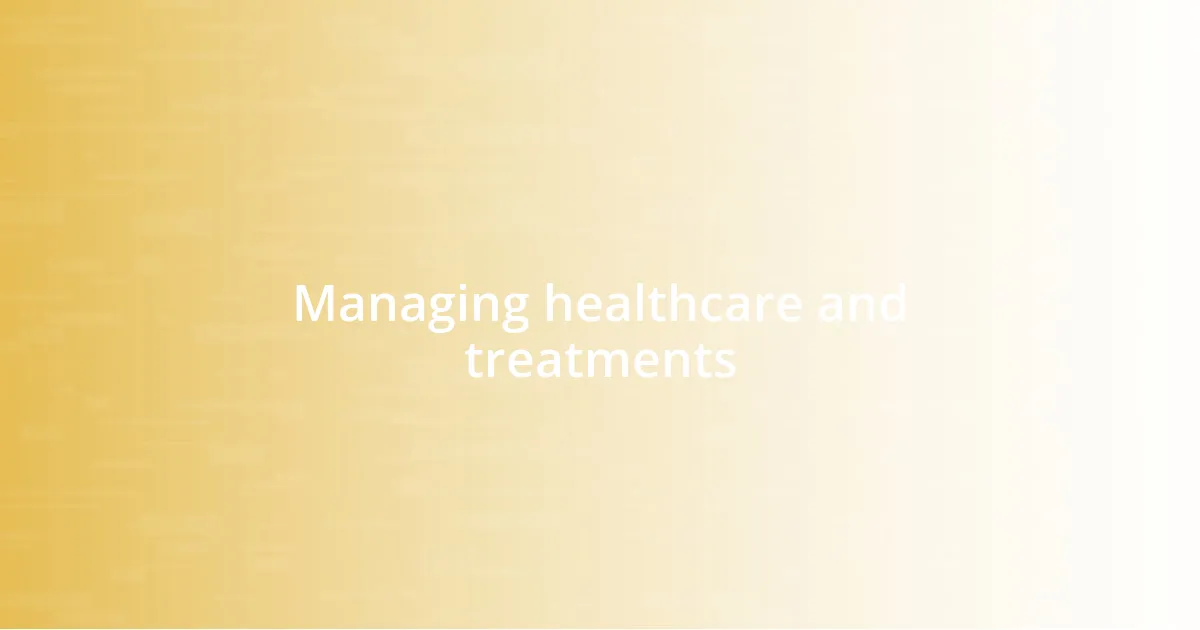
Managing healthcare and treatments
Managing healthcare and treatments can feel overwhelming, especially right after an HIV diagnosis. I vividly remember sitting in my doctor’s office, surrounded by pamphlets and medical jargon that seemed to blur together. It took some time for me to realize that taking control of my health meant actively participating in my treatment decisions. I started by asking questions—lots of them. Why this medication? What are the side effects? I found that being informed helped me feel empowered rather than anxious.
Each doctor’s visit became a learning experience. I made it a point to keep a health journal, noting down my symptoms and any side effects I experienced. This practice was not just about tracking my health; it became a valuable tool during appointments. When the doctor would ask how I was feeling, having those notes meant I could provide clear answers. It’s amazing how this simple habit transformed my handling of healthcare management. Have you tried keeping a health journal? It might surprise you how insightful it can be.
I also learned the importance of sticking to my medication schedule. Missing doses felt like a slippery slope, and I quickly realized consistency was key. I set reminders on my phone and even paired it with daily activities—like brushing my teeth—so I wouldn’t forget. It was the little things that made those big strides easier. Knowing that each step I took in managing my health was contributing to my overall well-being gave me a sense of control I desperately needed in those early days. It’s incredible how proactive steps can significantly impact one’s journey.
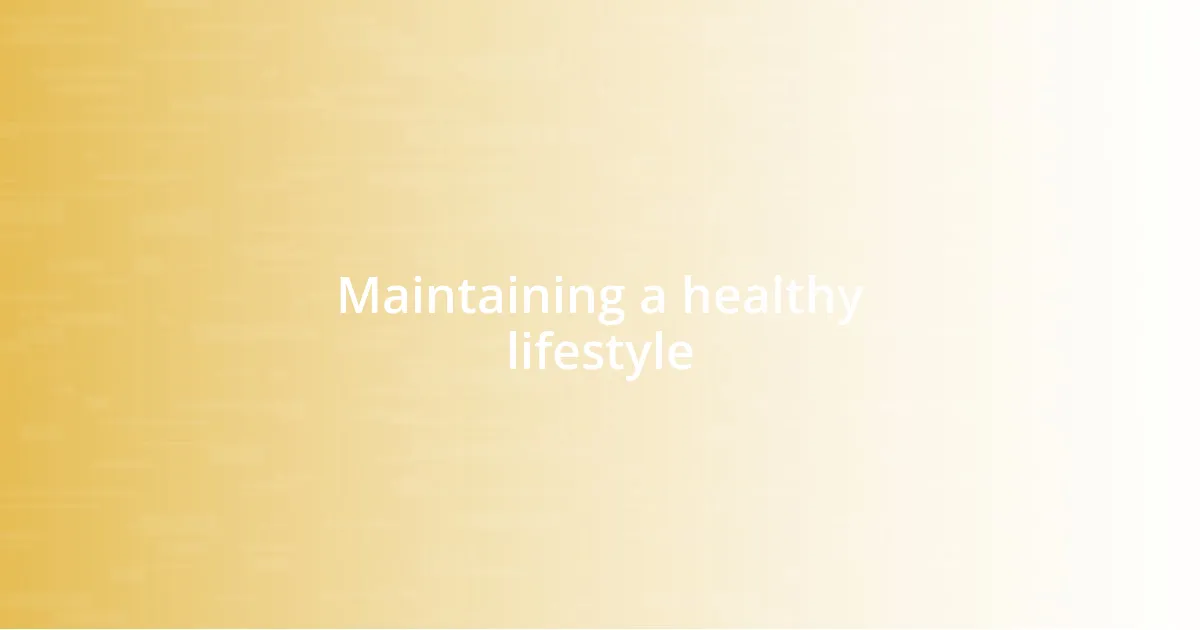
Maintaining a healthy lifestyle
I’ve discovered that maintaining a healthy lifestyle is one of the cornerstones of managing HIV effectively. Nutrition became a game changer for me; I started focusing on balanced meals that nourished my body. I can still remember my first attempt at meal prepping—an array of colorful veggies, lean proteins, and whole grains spilling out on my kitchen counter. It felt good to take that step, knowing I was feeding my body what it truly needed. Have you ever noticed how better food choices can transform your energy levels? For me, it was like flipping a switch—I felt more vibrant and ready to seize the day.
Staying active also played a significant role in my journey. I’ve never been a hardcore gym-goer, but I found joy in simple activities like walking in the park or practicing yoga at home. Those moments became my sanctuary, a chance to reconnect with my body and clear my mind. I remember a particularly tough week when I felt weighed down by anxiety; a brisk walk lifted my spirits more than I expected. Isn’t it fascinating how movement can help shake off those heavy feelings? The best part is, you don’t need to commit to a rigid exercise program—just find what feels good for you.
Keeping a consistent sleep schedule has also emerged as a hidden ally in my health journey. I noticed that when I prioritized rest, I woke up more refreshed and better equipped to tackle challenges. There was a time when I’d jitter from late nights and irregular schedules, which left me feeling drained and foggy. Have you ever experienced that lingering fatigue that makes everything feel harder? Establishing a calming bedtime routine made a huge difference. I began winding down with a book instead of scrolling through my phone, and I was amazed at how much clearer my mind felt the next day. Balancing nutrition, movement, and rest creates a beautiful synergy that supports not just my body but my emotional well-being too.
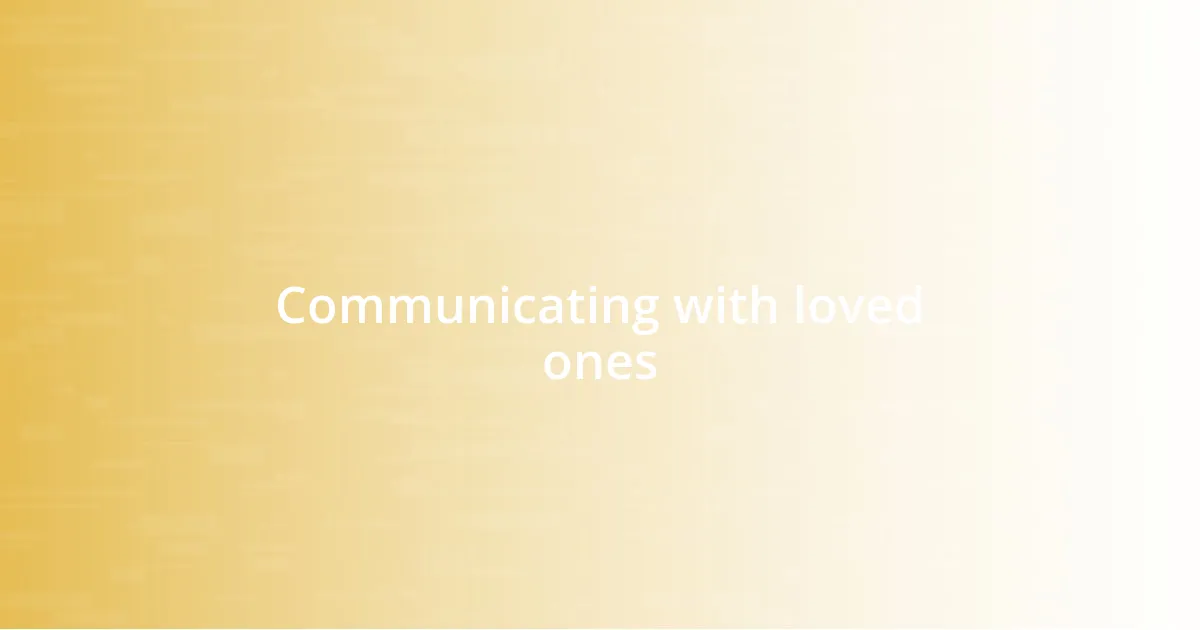
Communicating with loved ones
When I first grappled with my HIV diagnosis, sharing this part of my life with loved ones felt daunting. I remember gathering my closest friends and, with my heart racing, telling them about my status. What surprised me was their overwhelming support and willingness to listen rather than judge. Have you ever felt that a weight lifted just by sharing your truth? That moment taught me the power of vulnerability—it paved the way for deeper connections.
As conversations unfolded, I learned it was essential to be open about my feelings, too. I often found myself battling waves of anxiety and sadness, and expressing these emotions helped my loved ones understand what I was going through. One evening, I shared with my sister how isolating it felt at times. Her response was filled with compassion, reminding me that it was okay to feel this way and that I didn’t have to face it alone. Isn’t it refreshing to find someone who simply gets you? This dialogue deepened our bond and reassured me I had a support system cheering me on.
In navigating tough discussions, I discovered that setting boundaries was just as crucial. For instance, I appreciated when people asked questions, but I also needed them to respect moments when I wasn’t ready to talk. A close friend once apologized after unwittingly pushing me too hard for details. I learned to communicate my needs and express what felt comfortable for me. Have you ever had to set boundaries for your well-being? It’s a delicate balance, but those honest conversations turned my loved ones into allies, creating a safe space where we could all learn and grow together.
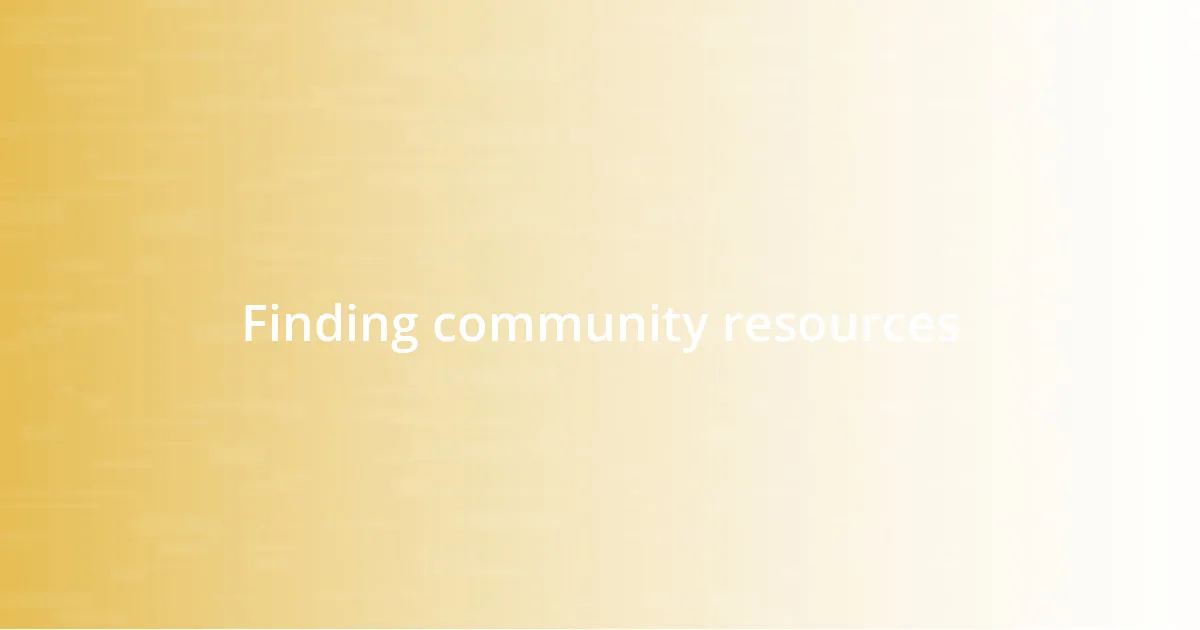
Finding community resources
Finding community resources became a lifeline for me after my diagnosis. I remember feeling overwhelmed and isolated, but a quick online search led me to local support groups and health services. Connecting with others who had similar experiences was like finding a sanctuary—those shared moments brought a sense of belonging that I desperately needed. Have you ever felt more at ease just by sharing your story with someone who truly understands?
As I explored various organizations, I was amazed at the wealth of resources available. I stumbled upon a community health center that offered free counseling and workshops on living with HIV. Walking into that center for the first time, I was apprehensive but hopeful. It turned out to be a transformative experience, as I met professionals who genuinely cared and equipped me with practical tools for managing my health. Have you ever been surprised by the kindness of strangers when you needed it most?
Additionally, I found that volunteer opportunities not only provided me with valuable resources but also allowed me to give back. Engaging with my community helped to shift my focus from my struggles to uplifting others facing similar challenges. I recall spending a Saturday at a local HIV awareness campaign, sharing my story and seeing the impact of my words resonate with others. Did you know that sharing your story can be a powerful tool for healing, both for yourself and for those who listen? These connections have truly enriched my life, proving to me that we are all in this together.
